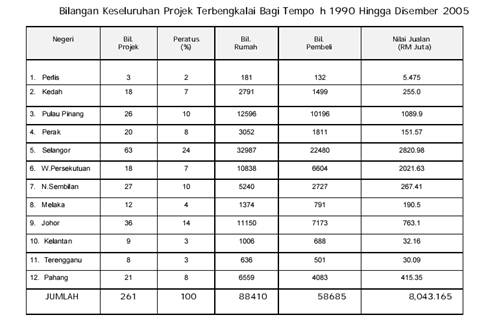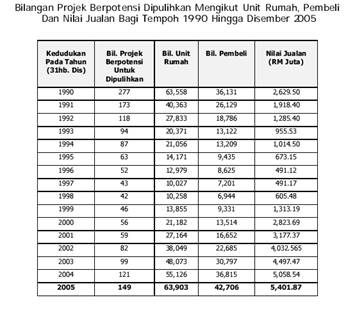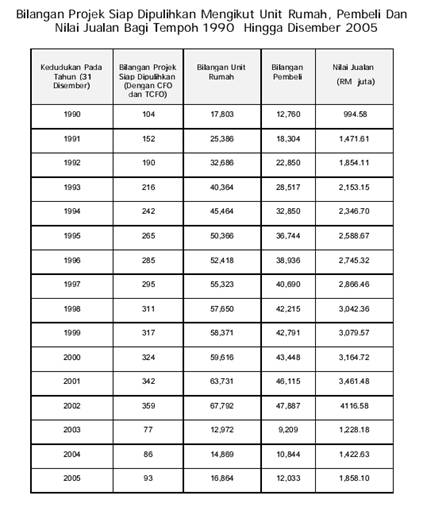Completion not guaranteed
01/07/2008 By National House Buyers Association
Published in Iproperty Magazine
With news that house prices
may rise by as much as 30% due to steel price hikes, those planning to
buy may regret not signing on earlier. Those who have, and are awaiting
completion of their homes, may smile at locking in their purchase, not
worrying even if prices of new launches skyrocket by 100%.
Conversely, some purchasers
may wonder if their under-construction homes can be completed on time
if the developers’ contractors renege on their contracts due to “hard”
times and loss-cutting measures. Judging from recent complaints in the
media, some purchasers who signed on years ago are still awaiting their
completed homes.
These tables from the Ministry
of Housing and Local Government (www.kpkt.gov.my) show the number of failed
housing projects by their original housing developers.
Table 1

Table 2

Table 3

Selangor State Housing
Management and Squatter Committee Chairman Iskandar Abdul Samad recently
revealed that the state has 141 abandoned projects, including 108 housing
projects. Confused about the figures? We are, too.
Protection from
abandoned projects?
No one can blame purchasers
for thinking they are protected. Policies, regulations and announcements
have been made towards improving housebuyers’ protection. In 1991, the
Housing Development Accounts’ (HDA) regulation was enforced to ensure
developers do not abandon their projects. We now know that the
HDA cannot prevent abandoned projects. In 2007, Act 118, the
Housing Development Act 1966, was amended to include “the protection of
the interest of purchasers”. Then Minister of Housing and Local Government
Dato’ Seri Ong Ka Ting, explained in Parliament that the insertion was
“to state clearly and emphasize that the real purpose and intention
of the Act includes the protection of the interest of purchasers”.
Not everyone seems aware
of Act 118’s “real” purpose. Second Finance Minister Tan Sri Nor Mohamed
Yakcop was quoted echoing the idea that: “Government not to be blamed
for abandoned housing projects” – NST 26/05/2008. Housing and Local Government
Ministry Secretary-General Datuk Ahmad Fuad Ismail added: “Buyers come
to us and ask, ‘What is the Ministry doing?’ But our powers are limited
(in issues relating to abandoned projects). The Ministry can only play
the role of a mediator” – The Star 26/05/2008. Is there really no
one who can take the bulls by their horns and ensure laws are enforced
and aggrieved buyers protected?
Section 11 of Act
118 – Powers of the Minister to give directions for the purpose of safeguarding
the interests of purchasers
Act 118 empowers the Minister
to issue directions to a licensed housing developer to safeguard purchasers’
interest, make other appropriate general directions and investigate housing
developers’ affairs. In reality, Ministers past and present are “shy”
to use this power. No wonder projects keep being stalled and abandoned.
Statutory Termination
(Section 8A of Act 118)
People buying from developers under the progressive system should understand
that the regulated contract of sale is for two major items – sale of a
yet-to-be constructed home and delivery of the completed home (if completed).
Even if you have signed the sale and purchase agreement (SPA), the project
may halt if the developer or purchasers apply to the Minister for approval
to terminate all SPAs within six months after executing the first SPA.
This is provided for in Section 8A. Developers are more likely to
apply for this statutory termination than purchasers, as each purchaser’s
consent is required and only the developer knows who they are.
Power to compromise with creditors and members
(Section 176 of Act 125 Companies Act 1965)
Subject to the approval
of three-fourths (3/4) in value of creditors or class of creditors, the
Court may grant approval for proposals for compromise or scheme of arrangement
between a company or liquidator and its creditors. Purchasers who are
unsecured creditors may have to abide by the court order. The restructuring
schemes may not favour purchasers, eg. waiving late delivery claims or
extending project completion deadline, but there is nothing much a purchaser
can do, except be resigned to accepting a quick solution to getting his
home completed. We know of no data collected on the financial losses of
purchasers in abandoned projects. Our view is that any developer showing
signs of inability to complete its projects should quickly have its projects
handed over to a competent party rather than have the court’s protection.
Second Finance Minister
Tan Sri Nor Mohamed Yakcop recently told Parliament that a total of RM356.2
million has been given out to developers to revive 74 abandoned projects
involving the construction of 17,730 houses (including 5,717 low-cost
houses) since a rehabilitation fund was formed in 1990. If this is not
a national disaster, what is it then?
Look out for the second
part of this article in the next issue.